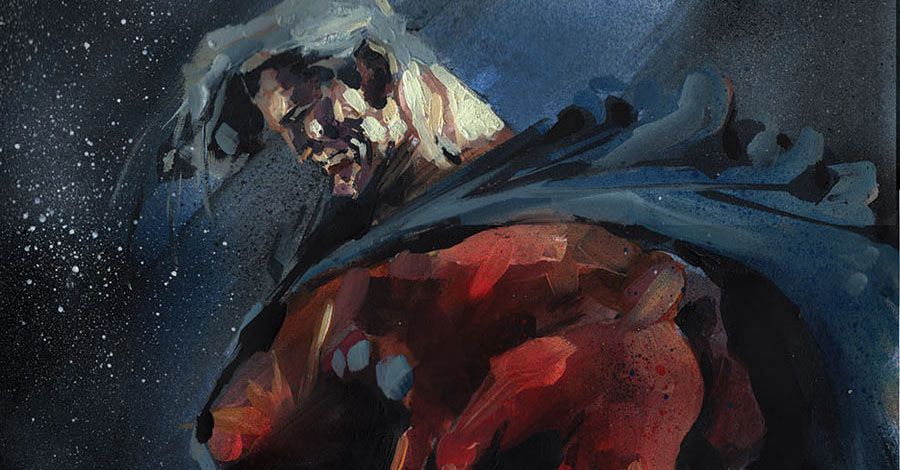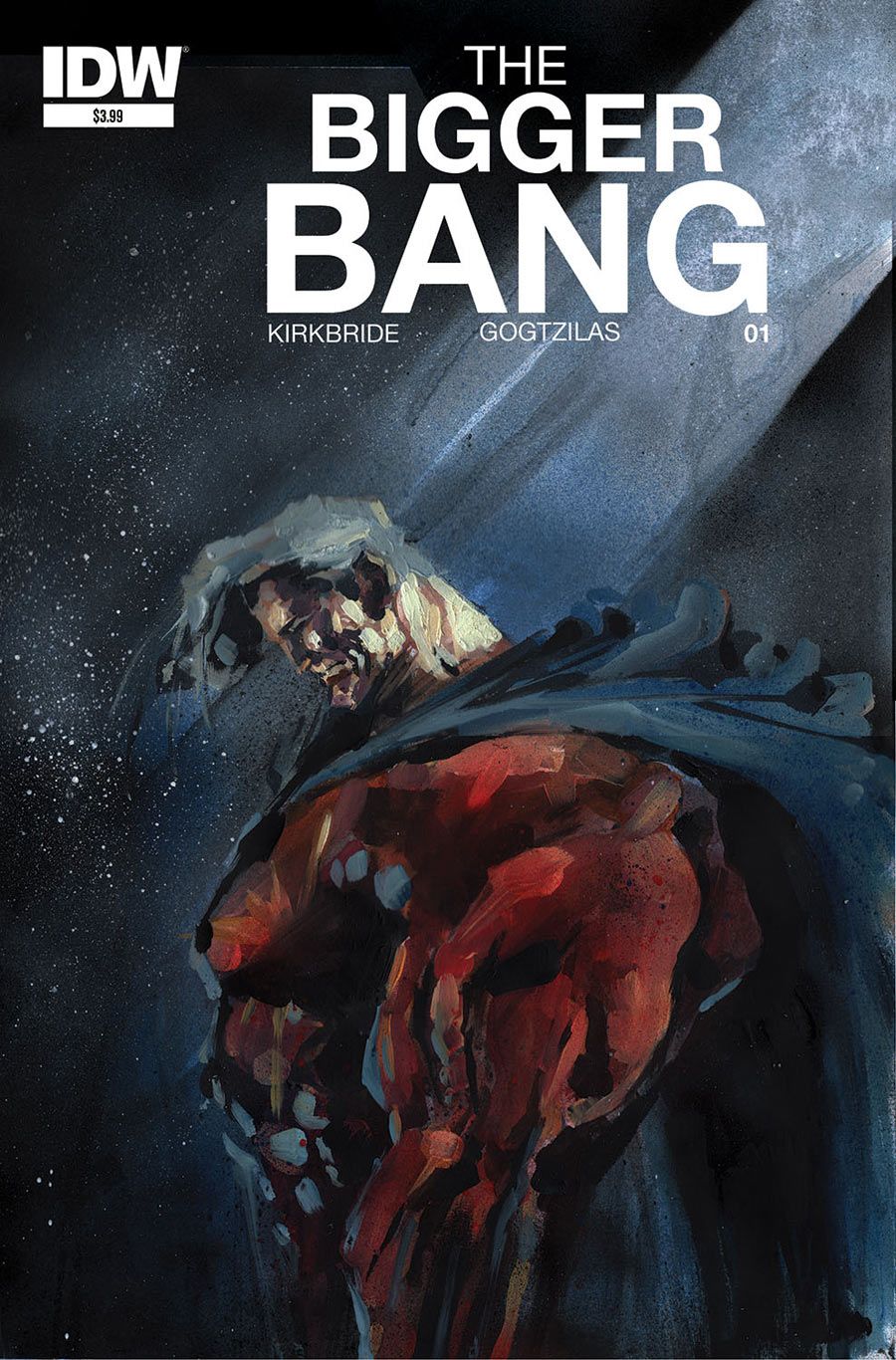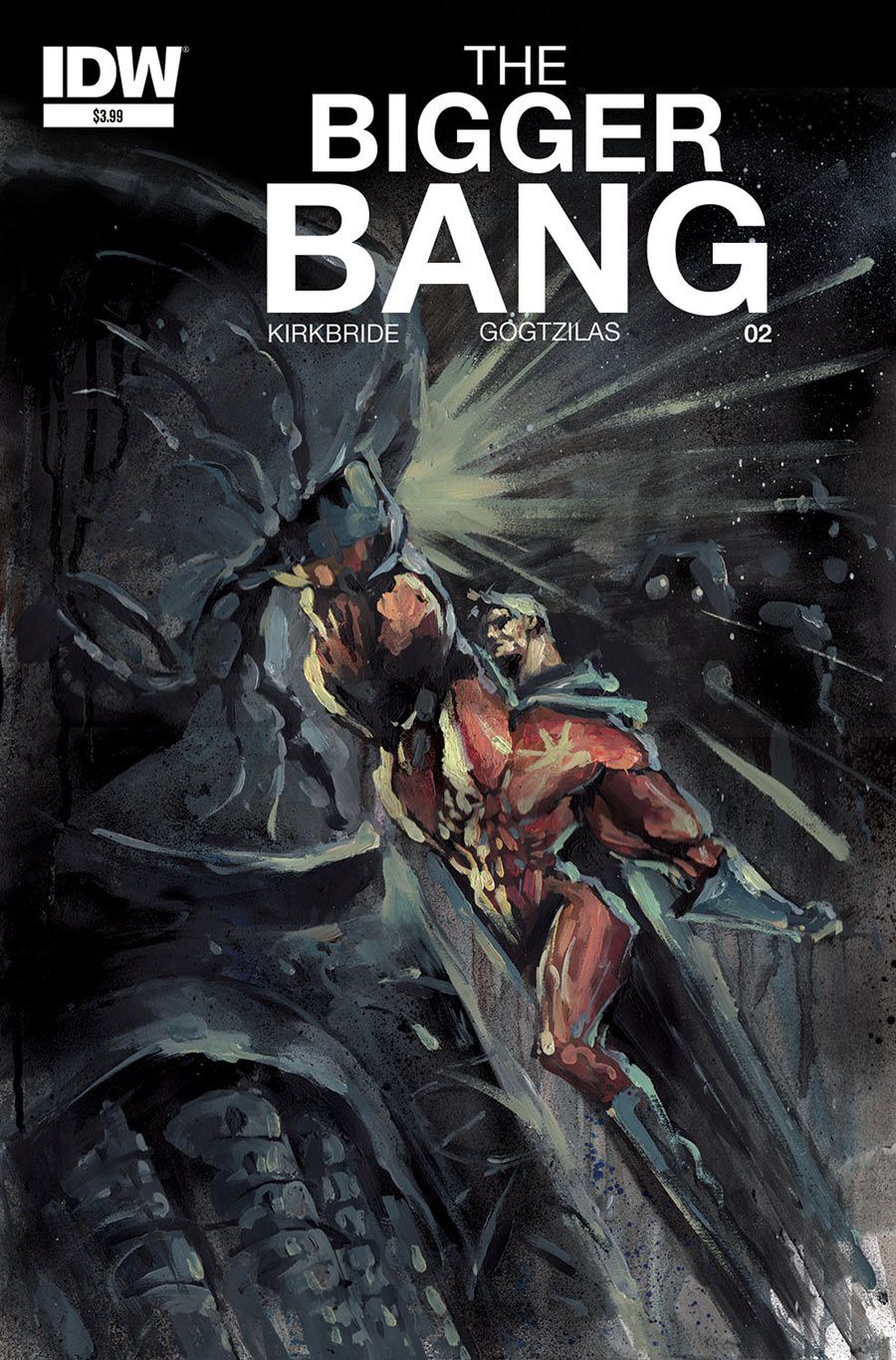In "The Bigger Bang," the upcoming IDW miniseries from D.J. Kirkbride, Vassilis Gogtzilas and Frank Cvetkovic, a new god wanders around the Universe. Named 'Cosmos,' he was created in a catastrophically destructive 'Bigger Bang' event -- which destroyed countless worlds and blew up the universe itself.
There was an explosion, everything went to hell, and when Cosmos showed up in the aftermath, it's fair to say that the survivors are not happy with him. The series focuses on him as he attempts to help people and atone a little for the hugely vicious event which caused him to be created in the first place. It's a high concept to kick off a book -- and that's without even factoring in the Cthulhu King who shows up, or the space pirates, or the fighter pilots, or...
There's a whole lot going on in the November-launching series, so CBR spoke Kirkbride and Gogtzilas to get some insight into their universe-destroying, god-creating, new story.
CBR News: Last time there was a Big Bang, the Universe was created -- so what comes out of the Bigger Bang?
D.J. Kirkbride: From the Bigger Bang comes one single being, a superhero space god-type known as Cosmos. This event destroys our universe's entire pocket in the multi-verse, and all that is created from it is him.
Who is Cosmos? How does his arrival play into the story of "The Bigger Bang?"
Kirkbride: Cosmos is actually trying to figure out who he is, what role he will play. His nature is, at his core, good -- but his birth was such a catastrophic event that even people in other universes know of him. They all experience an instinctual fear, as no single living creature has ever had so much blood on its hands.
What should we expect from the series? What kind of tone does it have?
Kirkbride: Even when writing it, I came to expect the unexpected. It has crazy space fantasy and epic action, coupled with a lot of soul searching -- and an overall sense of humor that I hope comes through. The book goes to dark places, but a lot of fun was had in the creating of it, in how goofy some kinds of serious can be, if that makes sense.
How expansive is the story you're telling here? Are we viewing things from Cosmos' perspective?
Kirkbride: Cosmos is the main character, but he's one of three leads (the other two being cosmic tyrant King Thulu, and his top space pilot, Captain Wyan). We see much of the story through Cosmos's eyes, but also from the people around him. So much of it is about perception versus truth, making assumptions before getting to know the facts.
How did the project come together? Was this a concept which one of you brought to the other, or did you create it together?
Kirkbride: Vassilis is the artist and co-creator on "The Bigger Bang." He initially approached Adam P. Knave and me about working together after having fun on a couple anthology stories. He had a drawing of a superhero-looking guy flying in space and generally wanted to work on some kind of science fiction book. As the project developed, I ended up going solo on the writing and came up with an idea of who this superhero was. Everything came from that initial image.
You've both worked with IDW before -- how did they come to be involved in this project?
Kirkbride: We both love IDW, so they were on the wish list. My editor on the "Amelia Cole" print collections, Justin Eisinger, was open to letting me run pitches by him, even though he usually oversees the book collections and graphic novels. Something about "The Bigger Bang" struck a chord with him, and he really championed the title with IDW. The book is there thanks to him, and we couldn't be happier.
What's the collaborative process been like? What made you each want to work with the other?
Vassilis Gogtzilas: I have found D.J.'s work very intriguing. In a way, I knew we would be a good match, given the fact that we both shared a tendency for quirky points of view. D.J. liked the looseness in my line work while I enjoyed his floating, vivid, and unique scripts. This lead to an organic collaboration in which I was sent a text to develop into pictures (finished pages), which were then sent back for the elaboration of the final script.
Vassilis, what made you want to do a story set in space? Has this always been an interest of yours?
Gogtzilas: My personal perception of space reflects a sense of loneliness. It always provided me with a strong feeling of a person's insignificance towards the chaotic wide universe. Despite the fact that this seems like a universal aspect, for an artist it also has a deeper meaning. It reminds you of endless lonely hours spent in a studio by yourself, following a bigger vision.
I believe your last project, Vassilis, was "The Adventures of Augusta Wind," where your art was a little more traditional. Since then, you've really evolved your style quite a lot -- would it be right to say you were possibly inspired by artists like Bill Sienkiewicz, or is this just the natural way your style has developed?
Gogtzilas: The design process is as unique as each person is. Like it happens in all forms of creation, no one is actually trying to reinvent the wheel. What we actually are trying is to find the best way to express our own design qualities in the most honest and personalized way. Taking this into consideration, the evolution of one's artwork is inevitable.
Once you had the basic concept, D.J., did the story come together quickly for you? When you're starting with a high concept, is it difficult to assemble a story around it which can withstand the central premise?
Kirkbride: The high concept came very quickly, and it was exiting, but making that premise into a story was challenging. It evolved a lot from the general plots to the art to the scripts. A big issue was that, if the Bigger Bang itself destroys our universe, uh -- what then? I had fun coming up with impossible scenarios and weird roadblocks that we then had to think ourselves out of. Justin has been a huge help as a voice of reason, especially when I have "What have I done???" moments.
When you have the sort of high concepts in a story that you do here, do you find that you start tapping into your inner Jack Kirby? Is it difficult, as a comic writer, to do new things with the cosmic which stand apart from creators like Kirby?
Kirkbride: No one in the universe had, has or will ever have a mind like Kirby's, so I tried to not even think about it, lest my brain froze up. I'm not as familiar with his work as I want to be, either. Part of that is wanting to have things to look forward to -- I fear the day of realizing I've read all the work of great creators like Kirby, if that makes any sense. It's the same reason I take long breaks between reading Kurt Vonnegut books. This book will stand apart for the same reason all books stand apart from Kirby: He's one of a kind.
Whatever we, Vass and I in this particular case, do with this or any other book will clearly have in its DNA everything we've read or talked about, even if subconsciously. If anything, working on "The Bigger Bang" has made me excited to go bigger and grander, which is pretty Kirby to me.
How do you go about taking the story and bringing it to the comic page? Do you try and keep things close to the script, or do you let Vassilis go wild?
Kirkbride: I break down the general issue stories, then further break down each page or couple of pages into a few paragraphs, sometimes with general filler dialog and text. Vass then goes to town drawing it, occasionally checking in if he wants to change something major, or if maybe the amount of story doesn't fit into the allotted pages, then I start scripting over his inks while he colors.
A lot of finessing and rewriting is done to the text before and, much to my shame, after the lettering process. It must be said that our letterer, Frank Cvetkovic, is a saint. He has worked a lot with Vass, Justin and me to tie the letters to the art and help guide the story through the text. It's been a wonderfully collaborative and organic process between the four of us.
When you're working with an artist like Vassilis, do you consciously try and work in sequences which play to his pretty experimental art style?
Kirkbride: Absolutely! And it took a lot of flexibility and back-and-forth on both of our parts to make it work. Vass is a visionary, and his drawing hand is faster than my typing fingers. It was difficult to keep up, but I think that we developed a fun and productive working relationship. I look forward to taking what we've learned to another project in the future. The guy blows my mind!
Above everything else, what would you say is the core theme of "The Bigger Bang?" Sure there are three-eyed warrior ladies and flying space castles -- but what do you see as being the core of your narrative?
Gogtzilas: There is a whole universe of superheroes out there in the comic book realm. Visitors to this realm are well accustomed to their "predictable" characteristics. What they would not expect, though, would be to discover a smaller universe within Cosmos' universe that's purely emotional.
What else are you both currently working on? Where can people find you -- and your work -- online?
Kirkbride: "Amelia Cole" is still ongoing digitally from Monkeybrain on ComiXology, and the third print trade is due a couple of weeks before "The Bigger Bang" issue 1, actually, from the fine folks at IDW. Other than these two projects, I have some pitches in the work, both co-writing with Adam P. Knave and typing solo. I really hope to get more work out there next year. If enough folks check out and like "The Bigger Bang," that dream will come true.
Gogtzilas: Speaking of "Augusta Wind," it's been inspirational and well accepted enough to motivate us for a second upcoming series --



